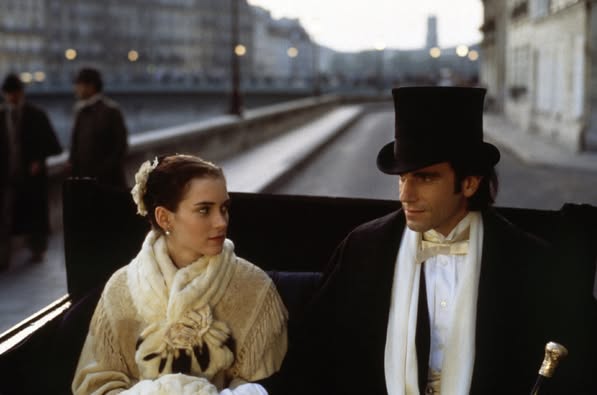The Age of Innocence (1993)

The Age of Innocence (1993) is a period drama directed by Martin Scorsese, based on the novel by Edith Wharton. The film is a richly detailed exploration of societal norms, love, and moral constraints set in the elite circles of 1870s New York City. It features a stellar cast, including Daniel Day-Lewis, Michelle Pfeiffer, and Winona Ryder.
The story follows Newland Archer (Daniel Day-Lewis), a young lawyer who is engaged to the beautiful and conventional May Welland (Winona Ryder). However, his life takes a complicated turn when he becomes enamored with May’s cousin, the unconventional and free-spirited Ellen Olenska (Michelle Pfeiffer). Ellen has returned to New York after separating from her abusive husband, and her presence challenges the rigid social conventions of their society.

Scorsese’s direction is both meticulous and lyrical, capturing the opulence of the Gilded Age while also conveying the suffocating nature of its social structures. The film’s cinematography, by Michael Ballhaus, elegantly frames the characters within their lavish surroundings, emphasizing both their wealth and the constraints imposed upon them. The lush production design and period costumes further immerse viewers in the world of high society.
The performances are exceptional, with Daniel Day-Lewis delivering a nuanced portrayal of Newland, a man torn between duty and desire. Pfeiffer’s Ellen is portrayed as a tragic figure, embodying both strength and vulnerability, while Ryder’s May is depicted as the idealized woman of the era, oblivious to the deeper currents of emotion around her.

At its core, The Age of Innocence is a meditation on the conflict between personal happiness and societal expectations. Newland’s internal struggle reflects the tension between his desires and the constraints of his class, culminating in a poignant exploration of love, regret, and sacrifice. The film raises questions about the cost of conformity and the true nature of love in a society governed by strict rules.
The screenplay, adapted by Scorsese and Jay Cocks, remains faithful to Wharton’s novel, capturing its themes and character complexities. The dialogue is rich and layered, reflecting the social mores of the time while allowing for emotional depth.

Upon its release, The Age of Innocence received critical acclaim, earning several Academy Award nominations, including Best Adapted Screenplay and Best Costume Design. It is often regarded as one of Scorsese’s more underrated films, showcasing his versatility as a director.
In conclusion, The Age of Innocence is a beautifully crafted film that explores themes of love, societal constraints, and the human condition. With its stunning visuals, powerful performances, and rich storytelling, it stands as a significant work in Scorsese’s oeuvre and a poignant adaptation of Wharton’s classic novel. Its exploration of the complexities of desire and duty continues to resonate with audiences today.











